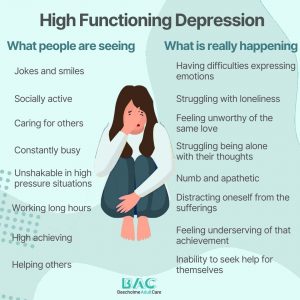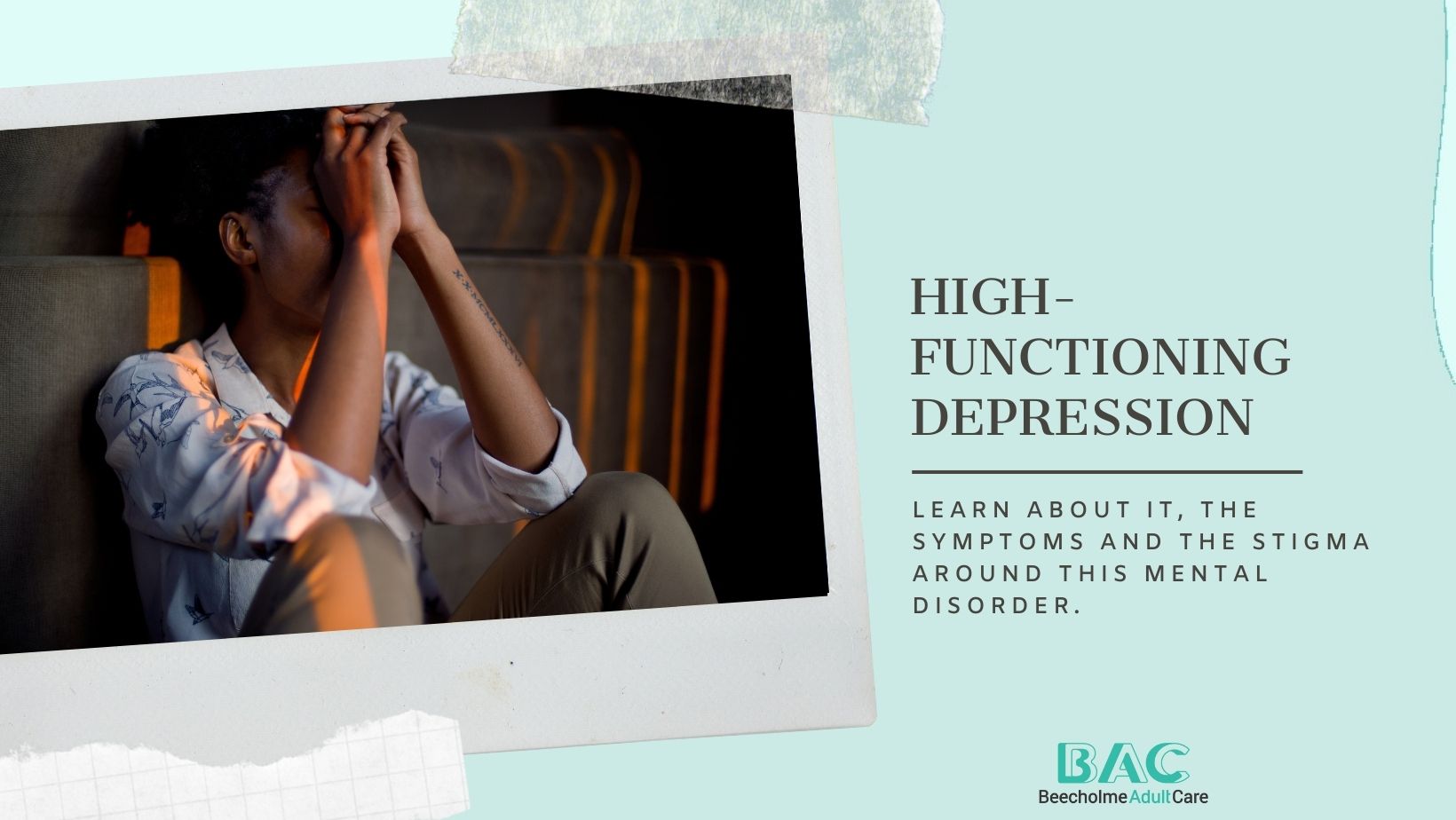The term “high-functioning depression” refers to someone who, from the outside, seems to be anything but depressed, but underneath is masking symptoms like feeling guilty or worthless, and even having thoughts of self-harm or suicide.’
There are many forms of depression.
Depression takes many forms and can range greatly in severeness. Some people will be severely depressed to the extent that they can’t get through the day, or out of bed, while some people will still be able to function while their insides are screaming into the void.
Getting through the day with severe depression is not the same as ‘feeling a bit down but still managing’.
It’s normal to feel sad sometimes. It’s normal to go through low periods just as it’s normal to be tired, grumpy, or in a particularly sunny mood. When you’re generally feeling low, you know that it will pass and that you’re in a crap mood, but that it won’t be forever.
Depression is more than just a low mood. It’s a combination of negative thoughts and cognitive distortions (feelings of worthlessness, re-living negative experiences and events, overgeneralisation, distorted interpretations of perfection), and physical reactions (poor concentration, low energy, problems sleeping, changes in appetite and loss of libido). Like most mental illnesses, depression can restrict an individual’s ability to go about their day-to-day activities or even complete the most basic task.
What is High Functioning Depression
High-functioning depression isn’t a clinical diagnosis. It’s more of a buzz word. But that doesn’t mean it isn’t real.
If an individual is described as having high-functioning depression it usually means that they are able to maintain their relationships, their work life and fulfil all their duties and life responsibilities, while also living with depression.
Generally, sufferers of high-functioning depression tend to be driven by their own unrealistic ideas of perfection. By trying to attain unachievable levels of perfection, individuals nurture feelings of failure and worthlessness when an unrealistic goal they set for themselves was not achieved.
Stigma around High-Functioning Depression
Loosely defined as a form of depression in which someone experiences the common symptoms of depression without it affecting their ability to complete day-to-day activities, people who are dealing with high functioning depression often struggle to access support precisely because they “seem fine” on the outside.
Because their symptoms are not significantly affecting behavior, friends, coworkers, and family members often don’t understand or even believe a serious illness is present.
Sometimes people struggling with this form of depression face stigma that makes them feel as if their disorder is not legitimate.
Someone with high functioning depression may also believe they’re “doing too well” to have depression and therefore avoid seeking help, or put their low mood and lack of energy down to other reasons such as poor sleep or not eating well (both of which can also be symptoms of depression).

Symptoms of High-Functioning Depression
For the most part, the symptoms of high functioning depression are the same as the typical depression symptoms – the main difference between the two is that people with high functioning depression typically don’t experience much disruption to their everyday life.
Apart from this the symptoms of high functioning depression are the same as depressive disorder – for example, feeling hopeless, helpless and/ or empty inside, experiencing tearfulness and irritability, feeling tired or easily fatigued either with or without sleep dysfunction, experiencing changes in eating behaviour and cognitive problems such as concentration on tasks that used to be completed without difficulty.
People suffering from high functioning depression tend also to have lost their interest in life. They may no longer have goals, enjoy their life, hobbies, friendships, or feel motivated to do anything.
This said, high-functioning depression carry some of the same symptoms as any other form of the disorder, including:
– Persistent sad, anxious, or “empty” mood
– Feelings of hopelessness, or pessimism
– Irritability
– Feelings of guilt, worthlessness, or helplessness
– Loss of interest or pleasure in hobbies and activities
– Decreased energy or fatigue
– Feeling restless or having trouble sitting still
– Appetite and/or weight changes
– Thoughts of death or suicide
– Aches or pains, headaches, cramps, or digestive problems without a clear physical cause
Triggers
Depression does not always require a trigger. However, certain situations and factors may be more likely to trigger a negative mindset.
Examples include:
– financial problems
– extremely high levels of stress
– the death of a loved one
– loneliness
– major life changes
How to Manage and Treat High-Functioning Depression
If you do have high-functioning depression, don’t fall into the trap of thinking that because you’re functioning it must mean everything is fine and manageable. You still need to keep tabs on how you’re doing, as chances are your daily life won’t stay exactly the same forever and any changes you encounter will need to be considered for impact on your mental health.
Check yourself, prioritise yourself, and schedule time for yourself into your high-functioning life, even if it’s just to go outside for a five minute walk around and cry.
The importance of therapy
Therapy is the best place a person can start treatment if they’re experiencing symptoms of depression.
Therapists can help a person identify the negative thoughts, beliefs, and habits that may be contributing to feeling depressed. It could also include things like medication, learning mindfulness skills, and doing activities linked to improving mood, such as exercise
According to the National Institute of Clinical Excellence (NICE), CBT or Cognitive Behavioural Therapy is recommended as an effective psychological treatment to overcome depression and maintain your mental health. An accredited CBT therapist will help sufferers recognise their negative thinking and behavioural patterns and work with them to take the steps to challenge their thoughts, beliefs and assumptions
Coping with depression
If you’re struggling with depression right now, it’s important to remember that you’re not alone, and that there are places and people who are able to help.
And for more information on depression, including what it is, how to cope and when and where to seek help, you can check out NHS Every Mind Matters or contact us for support.
Online therapy can help with depression
Improve your quality of life with the support of BAC online therapists.
If you or a loved one is struggling with mental health, you can find a qualified BAC counsellor ready to help you anytime anywhere.

